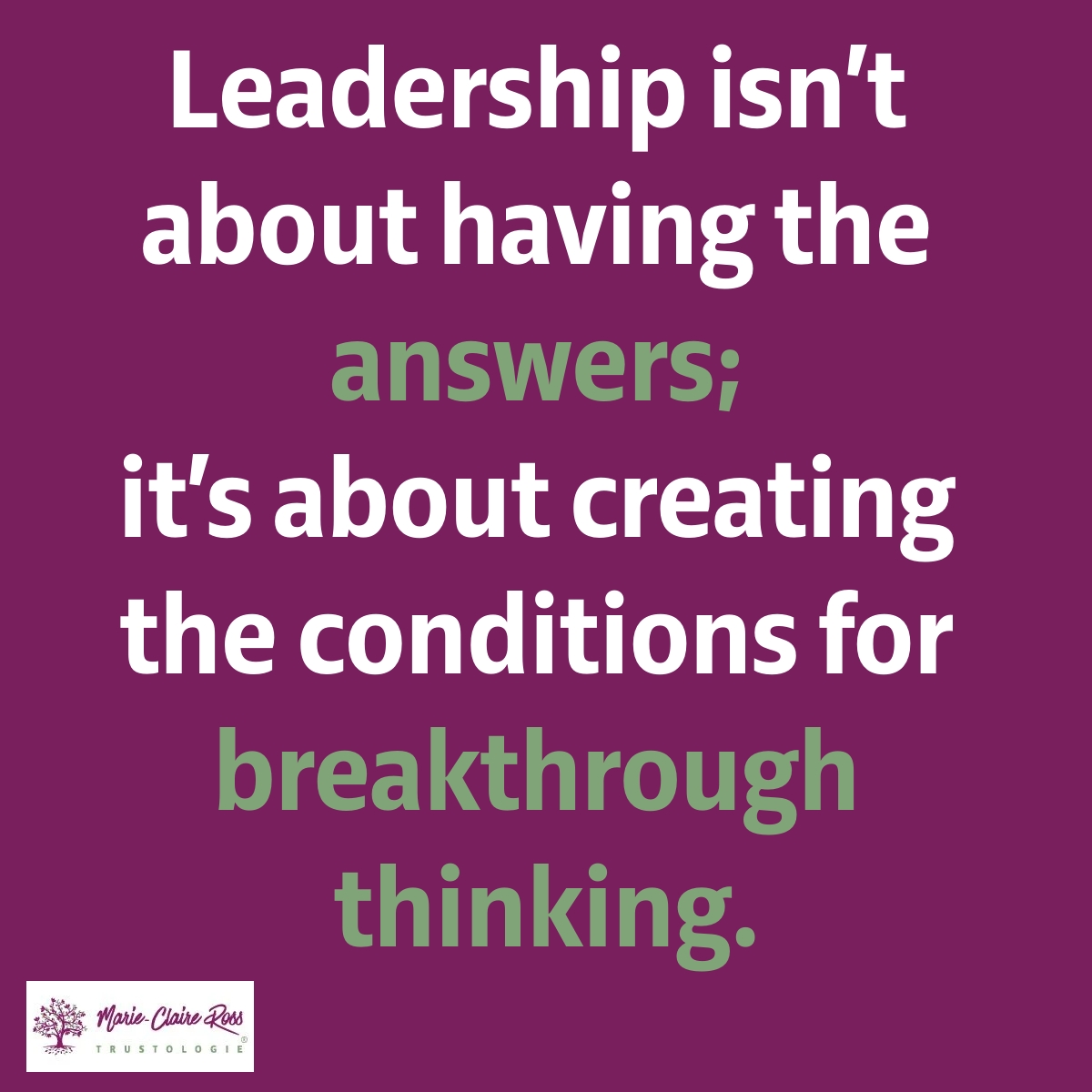8 min read
Beyond the "Why": 5 Coaching Secrets to Unlock Curiosity in Leadership
When my daughter was 17 months old, she discovered a superpower: the word “Why?”For the next two years, it was her response to almost everything.
Develop leaders, strengthen executive teams and gain deep insights with assessments designed to accelerate trust and performance.

Transform how your leaders think and perform with keynotes that spark connection, trust and high-performance cultures.

Explore practical tools, thought-leadership and resources to help you build trusted, high-performing teams.

Trustologie® is a leadership development consultancy founded by Marie-Claire Ross, specialising in helping executives and managers build high-trust, high-performing teams.

3 min read
Marie-Claire Ross : Updated on April 11, 2023

A study by Cornell University and Green Peak Partners wanted to uncover why 72 high performing CEOs running companies from $5 million to $50 billion were doing so well.
They initially thought the CEOs would be talented at planning, have loads of charisma or tonnes of grit. It turned out it was none of these things.
What these leaders had was self-awareness.
As Dr Travis Bradberry says in the book, Emotional Intelligence 2.0, "Emotional intelligence is your ability to recognise and understand emotions in yourself and others, and your ability to use this awareness to manage your behaviour and relationships. Self-awareness is empowering because it arms you with knowledge and enables you to make better choices — to change or grow.“
Self-awareness starts with bridging the gap between how you see yourself and how other people see you. Many of us aren’t aware of our mindsets and behaviours that are sabotaging our efforts to step into the achievement zone.
As a leadership coach, I am often called in to work with new and existing leaders. One of the stumbling blocks to their leadership is their current level of self-awareness.
To improve it, requires helping them understand their strengths and weaknesses (through a personality assessment) and then through gathering feedback from their team members and their boss. This is done through interviews and an online assessment. In other words, it's about calibrating their internal self-awareness with their external self-awareness (understanding how other people see us).
What's interesting is that there is always one or even two behaviours that they are constantly doing that are frustrating those around them. Often, the leader themselves knows this, but it's usually on the periphery of their awareness.
Learning how to ask for feedback and act on it is importance for self-development. It's a powerful tool to improve our leadership. Ideally, we are doing this regularly, so that we don't get derailed by behaviours that are creating issues.
According to a study by Carter Cast from his book, The Right (and Wrong) Stuff: Brilliant Careers are made and unmade, those who have an inflated sense of their own skills and who understate these interpersonal issues are six times more likely to fail than those with accurate self-awareness.
When it comes to improving our team leader skills, it's important to be clear on what type of team leadership skills are required to lead our team.
In my work, I break it down into three areas:
To successfully lead others requires being able to successfully lead ourselves. What our direct reports and boss wants to see are a range of behaviours that show we are confident in ourselves and trust the situation.
Behaviours such as being able to manage our emotions, staying positive during challenges, being accountable for our team's results and being able to admit mistakes. All of the behaviours that indicate we are self-aware and open to improving how we lead.
Your leadership influence needs to be centred on helping each individual do the best work they can, so they add more value to the team and to their own careers. This requires investing time understanding each person individually so you can guide them effectively in their development. It involves building trust with each person, so you can more deeply connect them to team members to create a team that trusts one another.
It's also about how you communicate expectations, deadlines and provide people with specific feedback to improve performance.
Your performance as a leader will be judged by what results you team achieves collectively.

8 min read
When my daughter was 17 months old, she discovered a superpower: the word “Why?”For the next two years, it was her response to almost everything.

11 min read
I have a friend who often finds herself at the mercy of her emotions. Recently, she called me to rehash a confrontation she’d had with a group of...

9 min read
True leadership presence isn’t a performance or a set of charisma hacks; it is the felt experience of who you are being in the room. By cultivating...
-1.jpg)
Last week, I was facilitating a workshop with senior leaders in a school leadership team. The workshop involved some deep, uncomfortable work about...

When it comes to training staff on safety or procedures, one of the biggest problems many of our clients talk about is the difficulty of training...

Everything we do is communication. And it is no wonder that research studies point to 70% of workplace mistakes being caused by poor communication. ...